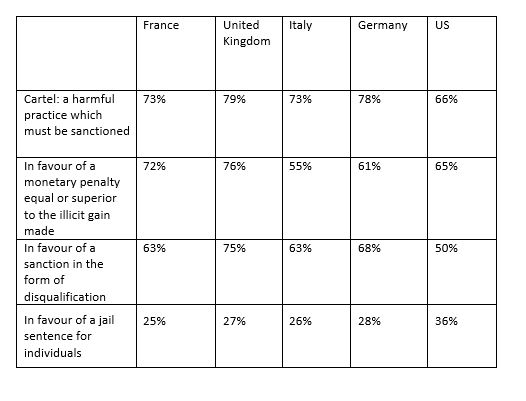22 January 2018: IFOP Survey for the Autorité de la concurrence

French people are largely opposed to cartels and believe that they should be severely penalised
The Autorité de la concurrence commissioned a researcher at Université Paris 1 (Constance Monnier) and IFOP, in June 2017, to design and conduct a survey of French views of cartel practices, with a representative sample of 2,510 people. The complete analysis of the methodology and the results will be published in academic journals1.
A strong condemnation of cartels
The survey shows that 73% of the French population disapprove of cartels. Thus, French people are sharply aware of the detrimental effect of these practices on the economy. This situation is in line with the results observed in similar studies carried out in Italy (73%), Germany (78%), the United-Kingdom (79%) and the United States (66%). If French people are against secret price-fixing cartels, they are also opposed to collective boycott practices or exclusivity clauses, which aim at foreclosing competition in the market and hamper the emergence of competitors (69% of the respondents).
Condemnation of cartel practices mostly results from a strong moral reprobation: for 97% of the respondents it is, above all, a reprehensible practice as it is « hidden » and as it harms competition and the functioning of the market. The dishonest aspect of this type of behaviour has been noted by 96% of respondents.
French people consider that sanctions should be dissuasive enough and would even be in favour of an extension of these sanctions to individuals, without going as far as jail sentences.
More than one French person out of two considers that cartels are as serious as or more serious than theft (56% of the respondents). In studies carried out abroad, cartel activities were never considered as serious as theft.
94% of the respondents claim that punishing cartels will deter other companies from engaging in this type of behaviour in the future. Further, 60% of them believe that the monetary penalty should be dissuasive by being “superior to the illicit gain”.
Moreover, the respondents are in favour of, along with sanctions against the company, individual sanctions. The possibility to disqualify the alleged perpetrators of the violation (by forbidding them from occupying a position of authority in a company) met a broad agreement (63%) as well as the proposition to fine individuals (55%).
However, the possibility of a jail sentence is largely rejected (only 25% of the respondents were in favour), along with public stigmatization of people. This result is in line with the results observed in similar studies carried out in other countries, except in the United States where prison sentence was met with a slightly higher public acceptance.
A few international comparison points:

> To access the results of the IFOP Survey, click here
> Press contact:
Chloé Duretête +33 1 55 04 01 20 / Email
1 « La perception des cartels et de la politique de concurrence en France : analyse et implications » (Perception of cartels and competition policy in France : analysis and implications), Emmanuel Combe and Constance Monnier, PRISM-Sorbonne, to be published,